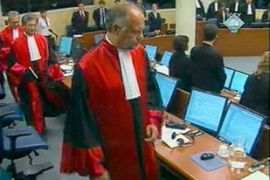Serbia cleared of genocide
Court says 1995 Srebrenica massacre was genocide but Belgrade was not responsible.

Rosalyn Higgins, the International Court of Justice (ICJ) president, while delivering the ruling on Monday, said: “The court concludes … there were acts of genocide committed by members of the Bosnian Serb army [in Srebrenica].”
It is the first time that the ICJ, the UN’s top court, has ruled that an event was genocide, which was made an international crime under a 1948 treaty after the Nazi Holocaust.
It is also the first time that a state has been tried for genocide.
‘Ethnic cleansing’
Bosnia accused Serbia of masterminding the widespread “ethnic cleansing” of Bosnian Muslims and Croats during the 1992-95 war, saying it amounted to genocide.
But the court said that Srebrenica was the only act of genocide in Bosnia during the conflict.
| Your Views | ||
|
“The court finds it has not been established by [Bosnia] that the killings amounted to genocide,” Higgins said.
In its ruling, the court said that Serbia “was making considerable military and financial support available to the [Bosnian Serb entity] Republika Srpska” but did not order the Srebrenica massacre or have control over the troops that carried it out.
If the court had ruled in favour of Bosnia, Serbia could have been liable for billions of dollars in compensation.
“The court finds … that the case is not one in which an order for payment of compensation … would be appropriate,” Higgins said at the end of a summary of the judgment.
More than 100,000 people died in the Balkans war between 1992 and 1995, which resulted in the break-up of the former Yugoslavia.
About 8,000 Muslims from Srebrenica and surrounding villages were killed in July 1995. The bodies of about half have been found in more than 80 mass graves in the area.
War crimes suspects
Serbia was criticised for failing to punish the perpetrators of the massacre and the court urged Belgrade to hand over Radovan Karadzic, the wartime Bosnian Serb leader, and Ratko Mladic, his military commander, to the UN court in the Hague.
| In Detail |
The two men are on the run after being indicted by the International Criminal Tribunal for the former Yugoslavia.
Serbia has said that a ruling against it would prove an unjust and lasting stigma on the state, which overthrew its wartime leader Slobodan Milosevic in 2000.
But after the verdict, the Serbian legal team called the result “balanced”.
“Serbia is relieved and satisfied,” Xavier de Roux, a French lawyer on the Serbian ICJ team, said.
“It’s a judgment that can bring peace. It is the end of a terrible fight this should allow for the difficulties between the former Yugoslav states to be ironed out.”
‘Historic’ judgment
Phon van der Biesen, a lawyer with the Bosnian team in The Hague, said the ruling was historic.
“This establishes what really happend in Bosnia, Belgrade cannot deny there was a genocide in Srebrenica,” he said.
|
“I am stunned. This is terrible – I saw with my own eyes who started this war and who kept up the aggression. It was the Serbs” Hedija Krdzic, who lost her husband, father and grandfather at Srebrenica in eastern Bosnia |
About 50 people had demonstrated outside the court on Monday calling for a genocide verdict.
“A ruling that Serbia committed genocide in Bosnia means everything to me,” Hedija Krdzic, who lost her husband, father and grandfather at Srebrenica in eastern Bosnia, said during the protest.
Afterwards she told Reuters: “I am stunned. This is terrible – I saw with my own eyes who started this war and who kept up the aggression. It was the Serbs.”
Al Jazeera’s Alan Fisher reported from Sarejevo that the verdict was received by the Bosnians with “anger, resentment and even resignation”.
“Because the Bosnians believed that they took the action not just for themselves but for every country threatened by genocide.
“Now they feel they are badly let down by the world court.”
Al Jazeera is not responsible for the content of external websites.